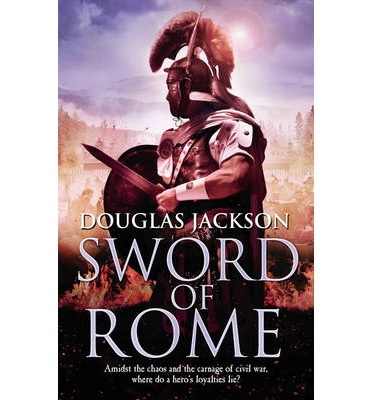Douglas Jackson’s Sword of Rome
It is criminal that it’s taken me so long to read ‘Sword of Rome’. Particularly given that Doug Jackson’s books are some of the literary highlights of my year. However, events conspired to keep it from me. What that meant was that during that dark and miserable time following New Year, at least I had a book to read which I was confident would be a belter!
I was so right. The Valerius Verrens series is one of the strongest historical series on sale at the moment of ANY era, let alone just the Roman. The first book (Hero of Rome) was one of the best I have ever read, and certainly concerned one of the most tense and memorable scenes of any novel. The sequel (Defender) was a strong contender and surprisingly successful, given the dark content and the controversial subject matter. Then along came book 3 (Avenger) and it was clear at that point that Doug’s series had hit the top of the genre. Avenger was one of my favourite books, perhaps better than Hero, though nothing will ever match the ‘siege of Colonia’ scenes. And with a lot to live up to, book 4 looked like it was fighting uphill, given that its subject matter is already strongly represented in Historical Fiction. Against the odds, Jackson has managed to turn that subject into a novel that vies with the best, and at least matches the quality of his previous epics if not surpassing them.
The reason?
It was the way the story was told, for me. The year of the four emperors (the civil war of 69AD) is a famous time about which I have read a great deal, and it is hard to find a new angle to examine such a thing. Henry Venmore-Rowland produced a nicely detailed account from a traditional viewpoint. Manda Scott showed us the same events from a most unusual and fascinating perspective. So what was left? Simply, to tell Valerius’ own story using the evens of the time as the pinball table around which our unwilling hero is bounced painfully.
Valerius is an excellently-constructed and believable character. Not a superman in a cuirass or a blue-eyed boy of the people. Nor is he even the embittered veteran. He has avoided or transcended all stereotypes to become a fully rounded character in whom everyone will be able to see something familiar and to their liking. In a similar fashion, Serpentius, his right hand man, is a character who has grown beyond mere ‘supporting cast’ status now, to the point where he could almost support his own spin-off.
In this installment, Valerius, having journeyed to Spain to serve Galba, who is set on becoming Nero’s successor, finds himself drawn into a sequence of events that will see him killing emperors, acclaiming emperors, serving emperors in battle and on secret missions, and standing his moral ground against them – and we’re talking more than one emperor here. Essentially, in this turbulent year, most characters of no conscience could float through the currents by throwing their support behind whoever wears the purple this week. Most characters of conscience would live for an emperor and die for him as the next contender comes along. Valerius is lucky (or possibly UNlucky) enough that while his conscience and his unbreakable word force him to support even lost causes against old friends, blind luck and a pig-headed unwillingness to back down see him bounce back each time.
Hence the pinball analogy. That is what the book will leave you with.
You will experience this heart-stopping time in Roman history from the fertile lands of southern France, to the seething streets of Rome, to the countryside of Latium, the deadly Alpine passes, the forests of Germany, and the beleaguered lands of northern Italy. And Valerius will be your guide.
Apart from the sheer breakneck speed of the plot, and the tense action, there are three things I find recommend Sword of Rome:
Focus on unusual details. What do you know about the First Adiutrix Legion? I know their basic history and they’re quite a fascinating bunch, but I only know them from dry textbooks. Now I’ve had the chance to see them face to face.
Characters. Apart from the powerful continuing characters and at least one truly stunning, wicked bad guy returning, Jackson’s portrayals of the unyielding Galba, the unfortunate Otho, the unwilling Vitellius and the unmanned Nero are fresh and vivid and help them stand out in a year when an emperor could come and go faster than you can put on your pants!
The plot arc. The very obvious plot arc for anyone wanting to write a book on the year of the four emperors begins with Nero’s fall from grace and demise, follows through the numerous brief reigns, and ends with the accession of the dynasty-founding Vespasian. It seems clear. Henry VR split his story into two books, but it was still a standalone story in two halves. Manda covered the arc in one go. Jackson has eschewed the obvious and left the tale in a most unexpected place. Reaching the epilogue, all I could think of was ‘When is Enemy of Rome out?’
So there you have it. Breakneck action, vivid characters, a fresh, believable perspective, and a fabulous plot with a stunning, unexpected end. Don’t want to read it yet? Are you barking mad?
Go buy. And if you’ve not started the series, check out my review for the last book by clicking on ‘Valerius 3’ on the right menu.
Another masterpiece, Doug.



Reblogged this on Historical Fiction reviews and commented:
A marvelous review..can’t wait to read it.
LikeLike
tigers68
January 29, 2014 at 9:50 am